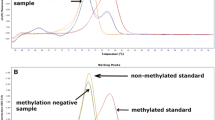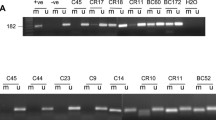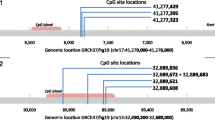Abstract
BRCA1 promoter methylation reportedly plays an important part in the pathogenesis of human breast cancer. In the present study, we investigated whether or not BRCA1 promoter methylation in peripheral blood cells (PBCs) can serve as a risk factor for developing breast cancer. The association of BRCA1 promoter methylation in PBCs with breast cancer risk was examined in a case–control study (200 breast cancer patients and 200 controls). BRCA1 promoter methylation in PBCs and breast tumors was determined with a methylation-specific quantitative PCR assay. BRCA1 promoter methylation in PBCs was seen in 43 (21.5%) of the breast cancer patients and in 27 (13.5%) of the controls. The odds ratio for breast cancer adjusted for other epidemiological risk factors was 1.73 (1.01–2.96) and was statistically significant (P = 0.045). When breast tumors were classified into those with and without BRCA1 promoter methylation, the odds ratio was 0.84 (0.43–1.64) (P = 0.61) for BRCA1 promoter methylation-negative and 17.78 (6.71–47.13) (P < 0.001) for BRCA1 promoter methylation-positive breast tumors. BRCA1 promoter methylation in PBCs is significantly associated with risk of breast cancer with BRCA1 promoter methylation. This seems to indicate that BRCA1 promoter methylation in PBCs may constitute a novel risk factor for breast cancer with BRCA1 promoter methylation.



Similar content being viewed by others
References
Miki Y, Swensen J, Shattuck-Eidens D et al (1994) A strong candidate for the breast and ovarian cancer susceptibility gene BRCA1. Science 266(5182):66–71
Easton DF, Bishop DT, Ford D et al (1993) Genetic linkage analysis in familial breast and ovarian cancer: results from 214 families. The Breast Cancer Linkage Consortium. Am J Hum Genet 52(4):678–701
Ford D, Easton DF, Bishop DT et al (1994) Risks of cancer in BRCA1-mutation carriers. Breast Cancer Linkage Consortium. Lancet 343(8899):692–695
Merajver SD, Frank TS, Xu J et al (1995) Germline BRCA1 mutations and loss of the wild-type allele in tumors from families with early onset breast and ovarian cancer. Clin Cancer Res 1(5):539–544
Cornelis RS, Neuhausen SL, Johansson O et al (1995) High allele loss rates at 17q12-q21 in breast and ovarian tumors from BRCAl-linked families. The Breast Cancer Linkage Consortium. Genes Chromosom Cancer 13(3):203–210
Takano M, Aida H, Tsuneki I et al (1997) Mutational analysis of BRCA1 gene in ovarian and breast-ovarian cancer families in Japan. Jpn J Cancer Res 88(4):407–413
Zhang J, Powell SN et al (2005) The role of the BRCA1 tumor suppressor in DNA double-strand break repair. Mol Cancer Res 3(10):531–539
Ting NS, Lee WH et al (2004) The DNA double-strand break response pathway: becoming more BRCAish than ever. DNA Repair (Amst) 3(8–9):935–944
Yoshida K, Miki Y et al (2004) Role of BRCA1 and BRCA2 as regulators of DNA repair, transcription, and cell cycle in response to DNA damage. Cancer Sci 95(11):866–871
Mullan PB, Quinn JE, Harkin DP et al (2006) The role of BRCA1 in transcriptional regulation and cell cycle control. Oncogene 25(43):5854–5863
Somasundaram K et al (2003) Breast cancer gene 1 (BRCA1): role in cell cycle regulation and DNA repair–perhaps through transcription. J Cell Biochem 88(6):1084–1091
Xia Y, Pao GM, Chen HW et al (2003) Enhancement of BRCA1 E3 ubiquitin ligase activity through direct interaction with the BARD1 protein. J Biol Chem 278(7):5255–5263
Hashizume R, Fukuda M, Maeda I et al (2001) The RING heterodimer BRCA1-BARD1 is a ubiquitin ligase inactivated by a breast cancer-derived mutation. J Biol Chem 276(18):14537–14540
Futreal PA, Liu Q, Shattuck-Eidens D et al (1994) BRCA1 mutations in primary breast and ovarian carcinomas. Science 266(5182):120–122
Xu CF, Solomon E et al (1996) Mutations of the BRCA1 gene in human cancer. Semin Cancer Biol 7(1):33–40
Yang Q, Yoshimura G, Nakamura M et al (2002) BRCA1 in non-inherited breast carcinomas (Review). Oncol Rep 9(6):1329–1333
Matros E, Wang ZC, Lodeiro G et al (2005) BRCA1 promoter methylation in sporadic breast tumors: relationship to gene expression profiles. Breast Cancer Res Treat 91(2):179–186
Wei M, Grushko TA, Dignam J et al (2005) BRCA1 promoter methylation in sporadic breast cancer is associated with reduced BRCA1 copy number and chromosome 17 aneusomy. Cancer Res 65(23):10692–10699
Birgisdottir V, Stefansson OA, Bodvarsdottir SK et al (2006) Epigenetic silencing and deletion of the BRCA1 gene in sporadic breast cancer. Breast Cancer Res 8(4):R38
Catteau A, Morris JR et al (2002) BRCA1 methylation: a significant role in tumour development? Semin Cancer Biol 12(5):359–371
Catteau A, Harris WH, Xu CF et al (1999) Methylation of the BRCA1 promoter region in sporadic breast and ovarian cancer: correlation with disease characteristics. Oncogene 18(11):1957–1965
Bianco T, Chenevix-Trench G, Walsh DC et al (2000) Tumour-specific distribution of BRCA1 promoter region methylation supports a pathogenetic role in breast and ovarian cancer. Carcinogenesis 21(2):147–151
Tapia T, Smalley SV, Kohen P et al (2008) Promoter hypermethylation of BRCA1 correlates with absence of expression in hereditary breast cancer tumors. Epigenetics 3(3):157–163
Miyoshi Y, Murase K, Oh K et al (2008) Basal-like subtype and BRCA1 dysfunction in breast cancers. Int J Clin Oncol 13(5):395–400
Snell C, Krypuy M, Wong EM et al (2008) RCA1 promoter methylation in peripheral blood DNA of mutation negative familial breast cancer patients with a BRCA1 tumour phenotype. Breast Cancer Res 10(1):R12
Flanagan JM, Munoz-Alegre M, Henderson S et al (2009) Gene-body hypermethylation of ATM in peripheral blood DNA of bilateral breast cancer patients. Hum Mol Genet 18(7):1332–1342
Arai T, Miyoshi Y, Kim SJ et al (2006) Association of GSTP1 CpG islands hypermethylation with poor prognosis in human breast cancers. Breast Cancer Res Treat 100(2):169–176
Hasegawa S, Miyoshi Y, Egawa C et al (2002) Mutational analysis of the class I beta-tubulin gene in human breast cancer. Int J Cancer 101(1):46–51
Miyoshi Y, Ando A, Hasegawa S et al (2003) Association of genetic polymorphisms in CYP19 and CYP1A1 with the oestrogen receptor-positive breast cancer risk. Eur J Cancer 39(17):2531–2537
Fackler MJ, Malone K, Zhang Z et al (2006) Quantitative multiplex methylation-specific PCR analysis doubles detection of tumor cells in breast ductal fluid. Clin Cancer Res 12(11 Pt 1):3306–3310
Tsuda H, Sasano H, Akiyama F et al (2002) Evaluation of interobserver agreement in scoring immunohistochemical results of HER-2/neu (c-erbB-2) expression detected by HercepTest, Nichirei polyclonal antibody, CB11 and TAB 250 in breast carcinoma. Pathol Int 52(2):126–134
Shibuta K, Ueo H, Furusawa H et al (2010) The relevance of intrinsic subtype to clinicopathological features and prognosis in 4,266 Japanese women with breast cancer. Breast Cancer. doi:10.1007/s12282-010-0209-6
Cristofanilli M, Budd GT, Ellis MJ et al (2004) Circulating tumor cells, disease progression, and survival in metastatic breast cancer. N Engl J Med 351(8):781–791
Niwa Y, Oyama T, Nakajima T et al (2000) BRCA1 expression status in relation to DNA methylation of the BRCA1 promoter region in sporadic breast cancers. Jpn J Cancer Res 91(5):519–526
Miyamoto K, Fukutomi T, Asada K et al (2002) Promoter hypermethylation and post-transcriptional mechanisms for reduced BRCA1 immunoreactivity in sporadic human breast cancers. Jpn J Clin Oncol 32(3):79–84
Mirza S, Sharma G, Prasad CP et al (2007) Promoter hypermethylation of TMS1, BRCA1, ERalpha and PRB in serum and tumor DNA of invasive ductal breast carcinoma patients. Life Sci 81(4):280–287
Chen Y, Toland AE, McLennan J et al (2006) Lack of germ-line promoter methylation in BRCA1-negative families with familial breast cancer. Genet Test 10(4):281–284
Issa JP, Ottaviano YL, Celano P et al (1994) Methylation of the oestrogen receptor CpG island links ageing and neoplasia in human colon. Nat Genet 7(4):536–540
Suijkerbuijk KP, Fackler MJ, Sukumar S et al (2008) Methylation is less abundant in BRCA1-associated compared with sporadic breast cancer. Ann Oncol 19(11):1870–1874
Gonzalo S et al (2009) Epigenetic alterations in aging. J Appl Physiol 109(2):589–597
Kontorovich T, Cohen Y, Nir U et al (2009) Promoter methylation patterns of ATM, ATR, BRCA1, BRCA2 and P53 as putative cancer risk modifiers in Jewish BRCA1/BRCA2 mutation carriers. Breast Cancer Res Treat 116(1):195–200
Chan TL, Yuen ST, Kong CK et al (2006) Heritable germline epimutation of MSH2 in a family with hereditary nonpolyposis colorectal cancer. Nat Genet 38(10):1178–1183
Galizia E, Giorgetti G, Piccinini G et al (2010) BRCA1 expression in triple negative sporadic breast cancers. Anal Quant Cytol Histol 32(1):24–29
Lee JS, Fackler MJ, Lee JH et al. (2010) Basal-like breast cancer displays distinct patterns of promoter methylation. Cancer Biol Ther 9(12):1017–1024
Smith RE, Good BC et al (2003) Chemoprevention of breast cancer and the trials of the National Surgical Adjuvant Breast and Bowel Project and others. Endocr Relat Cancer 10(3):347–357
Visvanathan K, Chlebowski RT, Hurley P et al (2009) American society of clinical oncology clinical practice guideline update on the use of pharmacologic interventions including tamoxifen, raloxifene, and aromatase inhibition for breast cancer risk reduction. J Clin Oncol 27(19):3235–3258
Rottenberg S, Jaspers JE, Kersbergen A et al (2008) High sensitivity of BRCA1-deficient mammary tumors to the PARP inhibitor AZD2281 alone and in combination with platinum drugs. Proc Natl Acad Sci USA 105(44):17079–17084
Fong PC, Boss DS, Yap TA et al (2009) Inhibition of poly(ADP-ribose) polymerase in tumors from BRCA mutation carriers. N Engl J Med 361(2):123–134
Perou CM, Sorlie T, Eisen MB et al (2000) Molecular portraits of human breast tumours. Nature 406(6797):747–752
Sorlie T, Tibshirani R, Parker J et al (2003) Repeated observation of breast tumor subtypes in independent gene expression data sets. Proc Natl Acad Sci USA 100(14):8418–8423
Carey LA, Perou CM, Livasy CA et al (2006) Race, breast cancer subtypes, and survival in the Carolina Breast Cancer Study. JAMA 295(21):2492–2502
Acknowledgments
Grant support: (1) Scientific Research on Priority Areas from the Ministry of Education, Culture, Sports, Science and Technology, Japan, and (2) Promotion of Cancer Research (Japan) for the 3rd Term Comprehensive 10-Year Strategy for Cancer Control.
Author information
Authors and Affiliations
Corresponding author
Rights and permissions
About this article
Cite this article
Iwamoto, T., Yamamoto, N., Taguchi, T. et al. BRCA1 promoter methylation in peripheral blood cells is associated with increased risk of breast cancer with BRCA1 promoter methylation. Breast Cancer Res Treat 129, 69–77 (2011). https://doi.org/10.1007/s10549-010-1188-1
Received:
Accepted:
Published:
Issue Date:
DOI: https://doi.org/10.1007/s10549-010-1188-1




